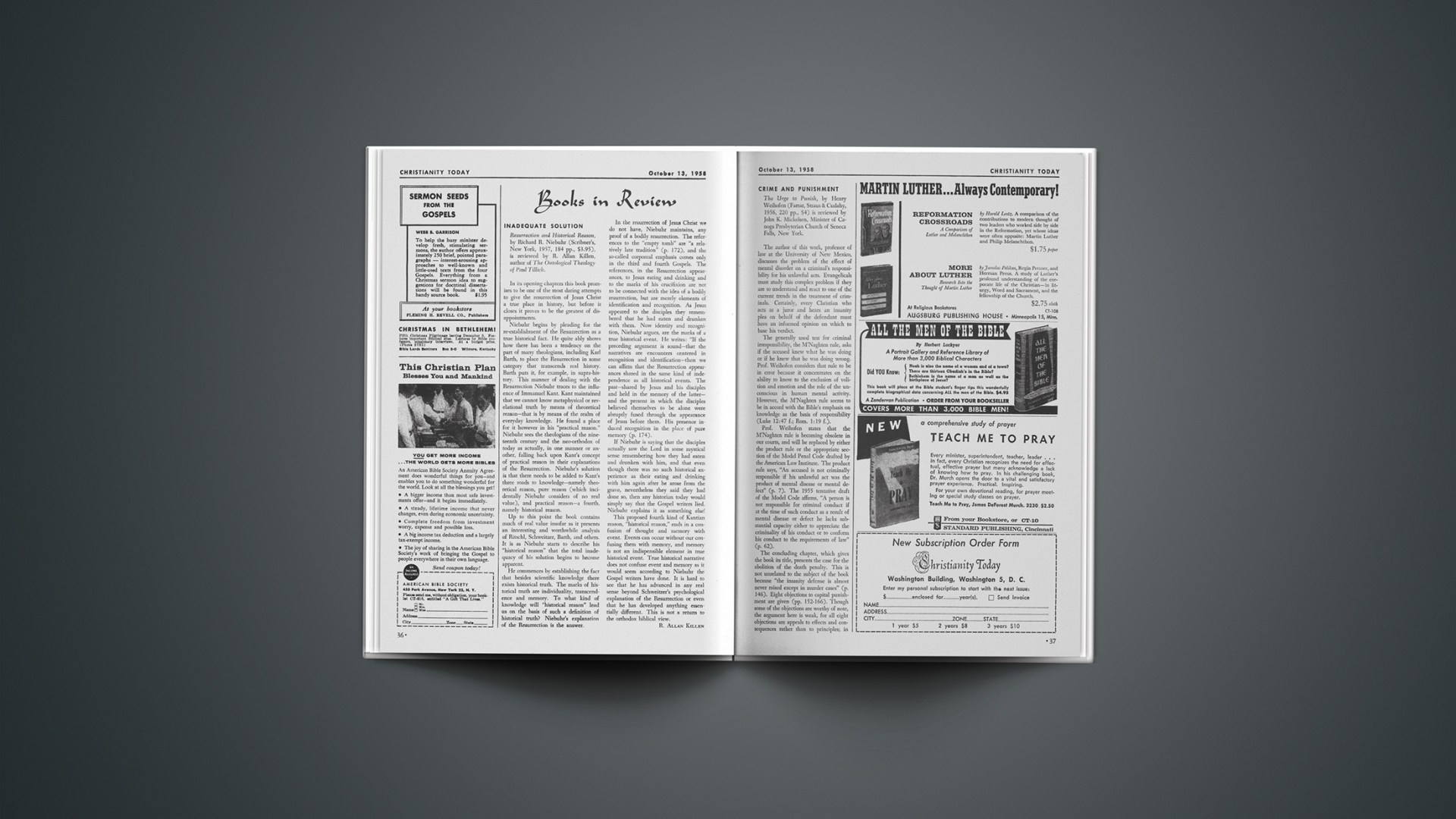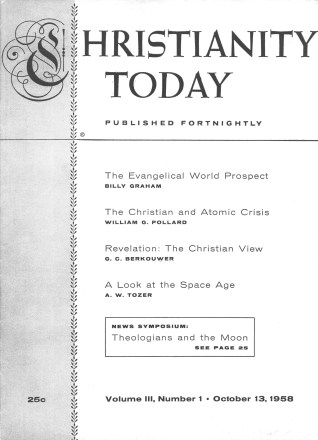Inadequate Solution
Resurrection and Historical Reason, by Richard R. Niebuhr (Scribner’s, New York, 1957, 184 pp., $3.95), is reviewed by R. Allan Killen, author of The Ontological Theology of Paul Tillich.
In its opening chapters this book promises to be one of the most daring attempts to give the resurrection of Jesus Christ a true place in history, but before it closes it proves to be the greatest of disappointments.
Niebuhr begins by pleading for the re-establishment of the Resurrection as a true historical fact. He quite ably shows how there has been a tendency on the part of many theologians, including Karl Barth, to place the Resurrection in some category that transcends real history. Barth puts it, for example, in supra-history. This manner of dealing with the Resurrection Niebuhr traces to the influence of Immanuel Kant. Kant maintained that we cannot know metaphysical or revelational truth by means of theoretical reason—that is by means of the realm of everyday knowledge. He found a place for it however in his “practical reason.” Niebuhr sees the theologians of the nineteenth century and the neo-orthodox of today as actually, in one manner or another, falling back upon Kant’s concept of practical reason in their explanations of the Resurrection. Niebuhr’s solution is that there needs to be added to Kant’s three roads to knowledge—namely theoretical reason, pure reason (which incidentally Niebuhr considers of no real value), and practical reason—a fourth, namely historical reason.
Up to this point the book contains much of real value insofar as it presents an interesting and worthwhile analysis of Ritschl, Schweitzer, Barth, and others. It is as Niebuhr starts to describe his “historical reason” that the total inadequacy of his solution begins to become apparent.
He commences by establishing the fact that besides scientific knowledge there exists historical truth. The marks of historical truth are individuality, transcendence and memory. To what kind of knowledge will “historical reason” lead us on the basis of such a definition of historical truth? Niebuhr’s explanation of the Resurrection is the answer.
In the resurrection of Jesus Christ we do not have, Niebuhr maintains, any proof of a bodily resurrection. The references to the “empty tomb” are “a relatively late tradition” (p. 172), and the so-called corporeal emphasis comes only in the third and fourth Gospels. The references, in the Resurrection appearances, to Jesus eating and drinking and to the marks of his crucifixion are not to be connected with the idea of a bodily resurrection, but are merely elements of identification and recognition. As Jesus appeared to the disciples they remembered that he had eaten and drunken with them. Now identity and recognition, Niebuhr argues, are the marks of a true historical event. He writes: “If the preceding argument is sound—that the narratives are encounters centered in recognition and identification—then we can affirm that the Resurrection appearances shared in the same kind of independence as all historical events. The past—shared by Jesus and his disciples and held in the memory of the latter—and the present in which the disciples believed themselves to be alone were abruptly fused through the appearance of Jesus before them. His presence induced recognition in the place of pure memory (p. 174).
If Niebuhr is saying that the disciples actually saw the Lord in some mystical sense remembering how they had eaten and drunken with him, and that even though there was no such historical experience as their eating and drinking with him again after he arose from the grave, nevertheless they said they had done so, then any historian today would simply say that the Gospel writers lied. Niebuhr explains it as something else!
This proposed fourth kind of Kantian reason, “historical reason,” ends in a confusion of thought and memory with event. Events can occur without our confusing them with memory, and memory is not an indispensible element in true historical event. True historical narrative does not confuse event and memory as it would seem according to Niebuhr the Gospel writers have done. It is hard to see that he has advanced in any real sense beyond Schweitzer’s psychological explanation of the Resurrection or even that he has developed anything essentially different. This is not a return to the orthodox biblical view.
R. ALLAN KILLEN
Crime And Punishment
The Urge to Punish, by Henry Weihofen (Farrar, Straus & Cudahy, 1956, 220 pp., $4) is reviewed by John K. Mickelsen, Minister of Canoga Presbyterian Church of Seneca Falls, New York.
The author of this work, professor of law at the University of New Mexico, discusses the problem of the effect of mental disorder on a criminal’s responsibility for his unlawful acts. Evangelicals must study this complex problem if they are to understand and react to one of the current trends in the treatment of criminals. Certainty, every Christian who acts as a juror and hears an insanity plea on behalf of the defendant must have an informed opinion on which to base his verdict.
The generally used test for criminal irresponsibility, the M’Naghten rule, asks if the accused knew what he was doing or if he knew that he was doing wrong. Prof. Weihofen considers that rule to be in error because it concentrates on the ability to know to the exclusion of volition and emotion and the role of the unconscious in human mental activity. However, the M’Naghten rule seems to be in accord with the Bible’s emphasis on knowledge as the basis of responsibility (Luke 12:47 f.; Rom. 1:19 f.).
Prof. Weihofen states that the M’Naghten rule is becoming obsolete in our courts, and will be replaced by either the product rule or the appropriate section of the Model Penal Code drafted by the American Law Institute. The product rule says, “An accused is not criminally responsible if his unlawful act was the product of mental disease or mental defect” (p. 7). The 1955 tentative draft of the Model Code affirms, “A person is not responsible for criminal conduct if at the time of such conduct as a result of mental disease or defect he lacks substantial capacity either to appreciate the criminality of his conduct or to conform his conduct to the requirements of law” (p. 62).
The concluding chapter, which gives the book its title, presents the case for the abolition of the death penalty. This is not unrelated to the subject of the book because “the insanity defense is almost never raised except in murder cases” (p. 146). Eight objections to capital punishment are given (pp. 152–166). Though some of the objections are worthy of note, the argument here is weak, for all eight objections are appeals to effects and consequences rather than to principles; in effect, this is an appeal to expediency. There is no recognition of the primary purpose of punishment, the vindication of God’s righteousness and justice (Rom. 13:1–4). Nor is there any awareness that, because murder is the destruction of God’s image in man, the one who murders deliberately must be executed (Gen. 9:6; Num. 35:6–32).
The other five chapters may be criticized on the ground that they also ignore the teachings of the Bible. This shows up in three ways. The psychology on which this work is based denies the existence of the soul (note 8, pp. 176 f.). Wrongdoing is defined by human law rather than by divine law; this the author accepts without protest (pp. 64 f.). And the presence of design and purpose in the universe is denied (p. 55), which is but another way of denying the providence of God.
Before evangelicals come to a common solution for the problem of mental irresponsibility they must come to agree on two things. They must agree on the effect of the freedom of the will on human responsibility; and here Jonathan Edwards’ The Freedom of the Will cannot be ignored. Secondly, evangelicals must arrive at substantial unanimity concerning the effect of mental disorder on the freedom of the will. If evangelicalism is to make an impact on this area of social responsibility our theologians and scientists must give both facets of this problem their attention. And if we are to make that impact in time to influence the present trend, our treatment of these facets must begin immediately.
JOHN K. MICKELSEN
Christian Soldier
Way to Glory: the Life of Havelock of Lucknow, by J. C. Pollock (Murray, London, 1957, 270 pp., 25s), is reviewed by Philip E. Hughes, lecturer of Mortlake Parish, London, England.
The name of Havelock of Lucknow is a name that means little to the present generation—so quickly is the fame of the heroes and great men of the past obscured. It is over 100 years since General Sir Henry Havelock died at Lucknow, November 24, 1857, and was mourned and acclaimed on all sides as a Christian soldier of dauntless courage and outstanding genius. The Daily Telegraph recorded that “For two days, in every circle from the palace to the cottage there was a national lamentation.” Luneral eulogies were uttered in churches and chapels throughout the land, including Westminster Abbey. Across the Atlantic, flags were flown at half-mast in New York and Boston, “a tribute of respect which,” according to the New York Times, “even the Duke of Wellington did not command and which we believe was never before paid to a foreigner.” The Duke of Cambridge, indeed, considered Havelock to be “equal and in some respects superior to Wellington.” However that may be, Havelock, by consistent integrity of character and perseverance during years of disappointment, and by the crowning blaze of his brilliant leadership at the height of the Indian Mutiny, achieved the ambition which he had expressed in the words, “to be surpassed by none in zeal and determination in the path of my duty because I was resolved to put down the vile calumny that a Christian could not be a meritorious soldier.”
But if the consummating event of his life was the victory at Lucknow, the crucial and most important event, and the key to his character, was his own conquest by the gospel of Jesus Christ on board ship when sailing out to India as a newly commissioned officer, aged 28. From then on he remained a faithful and fearless soldier of the King of kings. Eager to win others for Christ, he was not ashamed to organize informal services for the purpose of bringing the Gospel to such as would attend, despite the strong disapproval of his fellow officers. Appalled also at the dreadful hold which strong drink had over the soldiery and at the vicious excesses which were the consequence of drunkenness, he inaugurated a regimental temperance association and opened a coffee room, the prototype of the canteen clubs which are now taken for granted in service life.
As a military leader he was absolutely intrepid, and a remarkable strategist. Wherever, the firing was fiercest and the dangers greatest he was to be found on horseback setting an example of unsurpassed valor to his men. Though apparently altogether careless of his own personal safety and survival, and though his mount was shot from under him on half-a-dozen occasions, he came through all his engagements unscathed, so that his men came to regard his person as invulnerable and his leadership invincible. Even when the end came, it was acute dysentery and not the iron or steel of the enemy that carried him off.
Mr. Pollock has performed his biographical task most competently, realistically and sympathetically. He has made excellent use of his material.
PHILIP EDGCUMBE HUGHES










